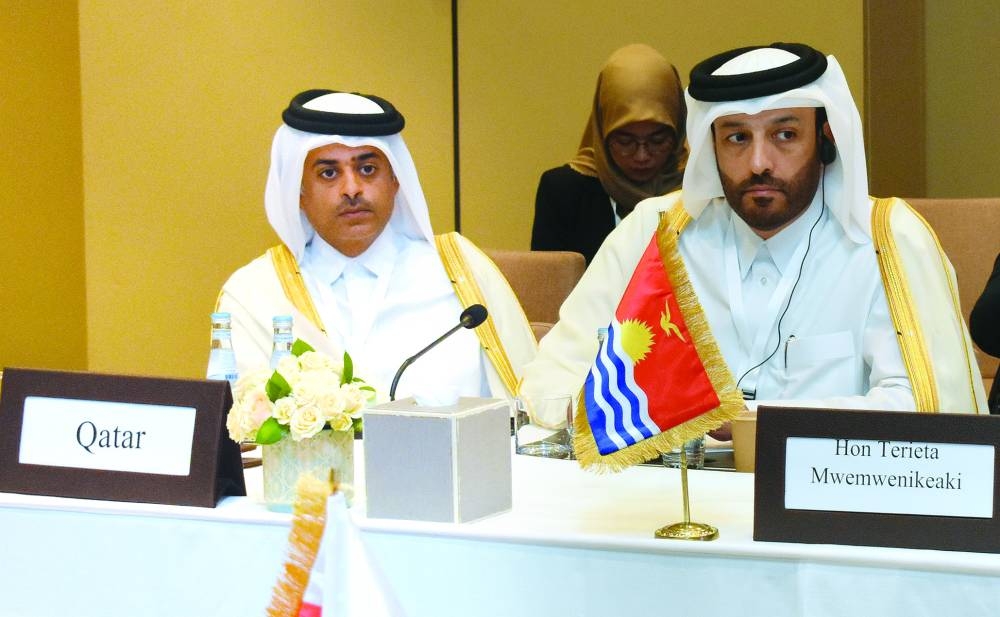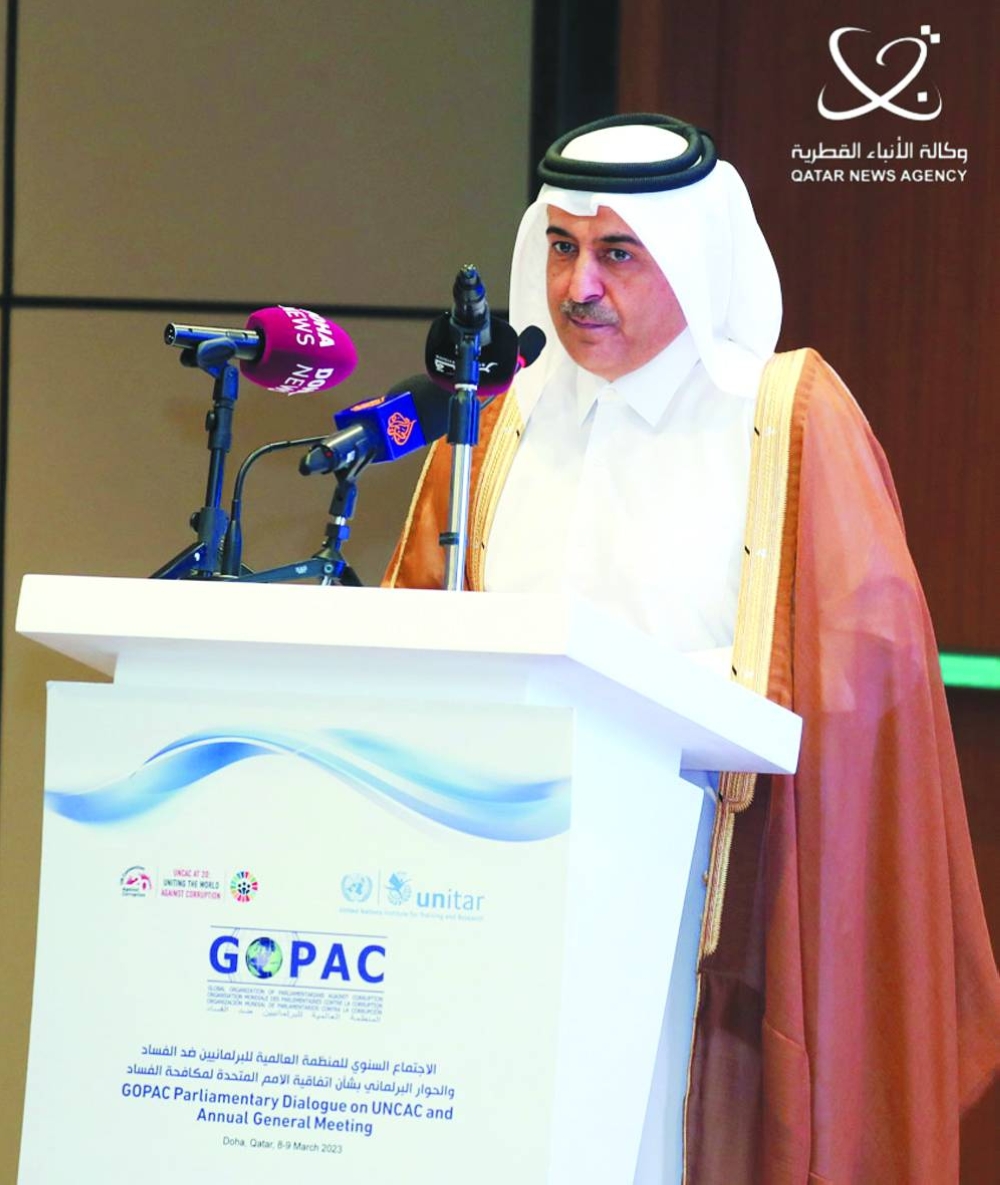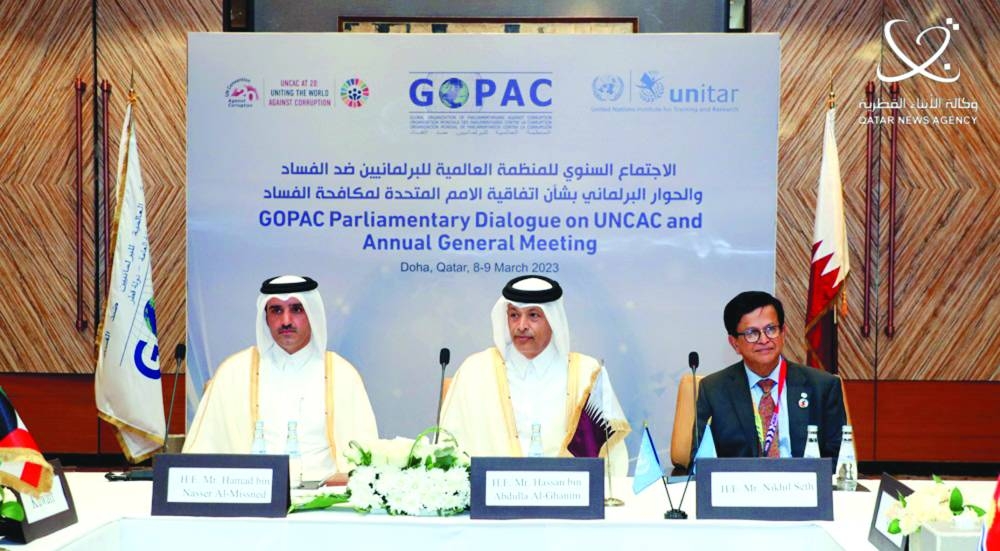The Parliamentary Dialogue of the Global Organisation of Parliamentarians Against Corruption (GOPAC) started in Doha on Wednesday, led by HE GOPAC Chairman Dr Ali bin Fetais al-Marri.
The two-day conference is being held on the occasion of the 20th anniversary of the United Nations Convention Against Corruption (UNCAC), the event's opening brought together HE Speaker of the Shura Council Hassan bin Abdullah al-Ghanim and a number of officials and representatives of UN agencies concerned with combating corruption, the official Qatar News Agency reports.
In his inaugural speech, HE Dr al-Marri stressed the importance of the parliamentarians' role in combating corruption and implementing the convention, by supporting legislation that contributes to fighting corruption and intensifying oversight and accountability. He highlighted the huge effects of the spread of corruption even in the most stable regimes, especially dragging nations into backwardness and ignorance, which leads to heavy losses for future generations.
He touched on examples and clear evidence of the impact of corruption on development in different countries around the world, triggering poverty, ignorance and backwardness despite their enormous natural resources and wealth. He also highlighted Qatar's efforts for development, described by a number of international organisations as an economic miracle, alluding to the interest the country attaches to education and healthcare sectors, which was clearly reflected in the budgets earmarked to the two sectors.
HE Dr al-Marri touched on the 2009 Doha Meeting that reviewed the implementation of the UN Convention against Corruption, and the efforts made to endorse the Doha Mechanisms to implement the convention and increase the effectiveness of monitoring over State parties to combat corruption.
At the end of his speech, he extended thanks to HE al-Ghanim, hailing his presence at the opening of the dialogue as a support for the efforts of parliamentarians in combating corruption.
HE President of the Administrative Control and Transparency Authority Hamad bin Nasser al-Misnad appreciated the GOPAC's efforts to combat corruption and implement the UN Convention, pointing out in this context that corruption is one of the serious threats to the security of societies and leads to obstructing development efforts, due to the association of various forms of corruption with forms of organised crime such as terrorism, money laundering and drug trafficking.
HE al-Misnad said the UNCAC laid the foundations for addressing corruption through a coherent speech for local, regional and international action, by setting a number of preemptive measures that countries take to prevent corruption. This reiterates the importance of parliamentarians' role in combating corruption thanks to the powers of parliaments and legislative assemblies in terms of accountability at the level of procedures and support for the common goals of combating corruption as a serious scourge impeding growth and progress of countries and threatening international peace and security.
HE President of the Administrative Control and Transparency Authority touched on the efforts of Qatar to implement the UNCAC by strengthening co-operation between the State parties to the convention, and working to take a number of measures and recommendations, pointing out in this context that Qatar will review in mid-March its current implementation of the convention and the most prominent measures in this aspect.
Executive Director of the UN Institute for Training and Research Nikhil Seth hailed the UN institute's role in supporting parliamentarians in combating corruption and implementing the UNCAC. The parliamentarians represent a moderate voice that works to enhance levels of integrity and credibility, reveal corruption and take the necessary measures in this regard, which needs them to show further support and cooperation, he said.
Chief of Section of the Corruption and Economic Crime Branch at UN Office on Drugs and Crime, Giovanni Gallo, expressed, in a speech delivered on behalf of Secretary of Conference of the States Parties (COSP) to the United Nations Convention against Corruption Brigitte Straub, his appreciation and thanks to Qatar and GOPAC, noting the role that parliamentarians play in exposing corruption that pollutes societies, undermines confidence in governments, and leads to political, economic and social crises.
Gallo considered the UNCAC an effective global tool to combat corruption, the importation of assets and co-operation between law-enforcement agencies, pointing to the role of the UNODC in monitoring the review mechanisms of the UNCAC that were adopted in Doha in 2009.
He said these mechanisms shed light on the practices that take place in the State parties, and provide good sharing of experiences and knowledge to correct mistakes and bridge the gaps facing those countries in combating corruption, pointing to the importance of working on enacting the necessary legislation to implement the convention, which is the role assigned to parliamentarians, stressing the need to follow up mechanisms for achieving and reviewing the objectives of the convention.
Held under the title 'The UN Convention against Corruption in its 20th year: the role of parliaments', the opening day's event was moderated by GOPAC Vice-President Dr Fadli Zon. The speakers addressed a number of topics related to the convention and the role of parliamentarians in implementing it, and supporting legislative and oversight efforts in the state parties to achieve its goals.
During the second dialogue session, which will be held under the title 'Parliament and Emergencies', the implementation of the provisions of the UNCAC will be discussed regarding public reporting (Article 10), the participation of all (Article 13), the protection of reporting persons (Article 33), ensuring the continuity and survival of legislative oversight, even during emergencies or any future crises.
The GOPAC annual general meeting will be held today. It will review and approve the minutes of the previous general assembly, review the organisation's report for the year 2022, study the report of the audit committee and the organisation's financial report. It will also review the reports of the GOPAC's regional branches.

The session in progress. PICTURE: Thajudheen

Officials attending the event. PICTURE: Thajudheen

HE Dr Ali bin Fetais al-Marri.

HE Hassan bin Abdullah al-Ghanim, HE Hamad bin Nasser al-Misnad and Nikhil Seth.
